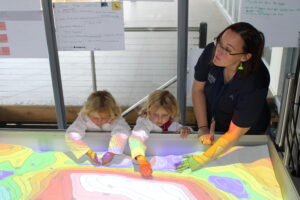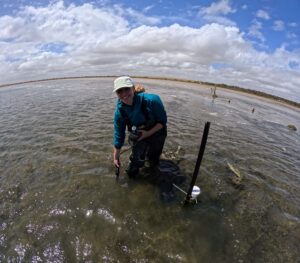
Plants play a critical role in aquatic ecosystems, providing habitat and food that support the diversity and abundance of invertebrates, fish and birds. This is the case for the Coorong, with the presence and location of aquatic plants (seagrasses) and algae affected by the environmental conditions of the water and sediment. The hypersaline and nutrient-enriched conditions, which have persisted in the South Lagoon of the Coorong over the past two decades have led to a change in dominant plant community composition, from submerged aquatic seagrasses to large areas of filamentous and free-living algae, in turn reducing the biodiversity and resilience of this important ecosystem.
In our August issue of Goyder Institute eNews, we published our first In Focus article on the Goyder Institute-led research being delivered as part of the $77.8 million Healthy Coorong, Healthy Basin (HCHB) Program. This initiative of the Australian and South Australian governments aims to support the long-term health of the Coorong by providing evidence-based solutions to both immediate threats and future conditions under a changing climate. The Goyder Institute for Water Research is the delivery partner for research components of HCHB, providing independent research to inform future management decisions for the region. The Coorong is an area of immense environmental, cultural and social value to South Australia and Australia.
In this issue, we explore the aquatic plants and algae communities in the South Lagoon of the Coorong and the environmental conditions causing changes to these communities that have knock on effects for the wider ecosystem health of the Coorong. This research is being led by Professor Michelle Waycott of the University of Adelaide, in partnership with research teams at Flinders University and the South Australian Research and Development Institute (SARDI).
Three species of submerged aquatic plants have historically existed under different conditions in the South Lagoon of the Coorong: Ruppia tuberosa, Ruppia megacarpa and Althenia cylindrocarpa. One of these species, R. megacarpa, prefers conditions of lower salinities; while R. tuberosa and A. cylindrocarpa are both highly resilient species able to tolerate hypersaline conditions such as those currently present in the South Lagoon of the Coorong. When not flowering, two of the seagrass species R. tuberosa and A. cylindrocarpa that currently co-exist in the South Lagoon are indistinguishable, in fact, it takes a world expert or DNA analysis to correctly identify the two species.

The research being undertaken by Prof. Waycott’s team is providing exciting new insights into the interactions between aquatic plants and algae, and how management efforts can help to restore the seagrass community and improve aquatic health in the South Lagoon and across the Coorong system.
“Submerged aquatic plants such as Ruppia and Althenia are what are known as ‘keystone’ species for the Coorong South Lagoon” said Prof. Waycott. “The plants contribute to maintaining water quality and stabilising sediment, while providing habitat for invertebrates and fish, and food for waterbirds.”
“However, the Coorong South Lagoon has seen changes in environmental conditions over the past 20 or so years where both salinity and the amount of nutrients has increased, and this has led to the reduction in aquatic plant populations and greater amounts of filamentous algae growing in the Coorong” said Prof. Waycott. “The algae can impede waterbird feeding, and adversely affect aquatic plants by restricting growth, reducing reproduction, and affecting the nutrient dynamics of the water and sediment.” “Consequently,” said Prof. Waycott, “the aquatic plant community is in a vulnerable state requiring restoration to help improve the environmental condition of the Coorong South Lagoon.”
The research team is undertaking intensive field work in the Coorong, sampling over 100 different locations in large-scale seasonal surveys to determine the presence and health of the aquatic plant communities and to gain further understanding of the impacts that the algae is having on these plants. The team is also monitoring specific sites across the southern Coorong (South Lagoon and southern North Lagoon) fortnightly to observe seagrass growth and automatic data loggers have been deployed to continuously monitor the environmental conditions being experienced throughout the life cycle of the seagrass community.
“The good news is that we have found more of the aquatic plant community at these 100 locations than expected” explained Prof. Waycott. “Unfortunately, the condition of these plants is often poor and the growth of the algae, which starts in late spring and continues over summer, really inhibits plant growth and reproduction. The filamentous algae, a symptom of the excess nutrients, is hampering the long-term recovery of the aquatic plant community following large-scale losses from the Coorong during the 2001-2010 period of the Millennium Drought.”
The submerged aquatic plant communities also play a key role in the nutrient dynamics of the Coorong ecosystem. As highlighted in last month’s In Focus article, much of the sediment in the South Lagoon of the Coorong contains little or no oxygen. When Ruppia plants gather enough light and photosynthesise, their roots release oxygen into the sediment. This oxygen release supports nutrient cycling and enhances sediment health by reducing the amount of oxygen-deprived (anoxic) sediment. Therefore, further increasing the presence of aquatic plant communities throughout the South Lagoon, while reducing the impact of the algae on these communities, can help to improve the nutrient conditions and nutrient cycling within the Coorong.
“We are working closely with Assoc. Prof Luke Mosley and his Nutrient Dynamics team of the HCHB Program to further understand how improving the presence and condition of the aquatic plants throughout the Coorong South Lagoon can help improve the nutrient conditions of the region” said Prof. Waycott. “In addition, we are examining the responses of the seagrass community to changes in water quality and sediment types to help identify thresholds for plant survival and subsequently future habitat requirements for the plants. This will provide a better understanding of the factors which are driving algal growth in the Coorong and how it affects the aquatic plant community.”
The next year of research being undertaken by the Goyder Institute team will further investigate the suitability of habitat throughout the Coorong South Lagoon for the growth of aquatic plants; as well as understanding the associations between aquatic plants, environmental conditions and microorganisms; and assessing the success of previous aquatic plant restoration efforts within the Coorong South Lagoon. The data collected as part of the aquatic plants and algae component of the HCHB Program will also be incorporated into complex biogeochemical modelling, which will give a greater understanding of the Coorong ecosystem as a whole and, allow predictions of the impacts of environmental change or effectiveness of interventions in improving ecosystem health.
More information on the HCHB aquatic plants and algae research can be found here. For further information on the Goyder Institute-led HCHB research, please contact Dr Alec Rolston.
This project is part of the Department for Environment and Water’s Healthy Coorong Healthy Basin Program, which is jointly funded by the Australian and South Australian governments.


